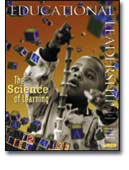How can you devise learning strategies compatible with your students' learning styles and cognitive development? What are some ways to meet the needs of students with learning disabilities? Here are Web sites that can help you answer these questions.
How We Learn
A good place to start is the Toddler Growth and Development section of KidSource Online (www.kidsource.com/kidsource/pages/toddlers.growth.html), a clearinghouse that provides ratings and reviews of relevant articles grouped by topic. Although aimed primarily at parents, the colorful, easy-to-use site is also helpful to educators who would like to know more about how children learn. Read "Brain Development Research—What It Means for Young Children," "Creativity for Emotional Intelligence: Ideas and Activities," or "Questions and Answers About Stuttering." You'll also find articles pertaining to K–12 education, newborns, and preschoolers, as well as a search engine that helps you explore eight online sources for information on learning disabilities (www.kidsource.com/kssearch/ldsearch.html).
Your next stop is the online version of How People Learn: Brain, Mind, Experience, and School (http://books.nap.edu/html/howpeople1) from the National Academy Press (NAP) of the National Research Council. In chapter 4, "How Children Learn," find out how children can use "clustering" to improve memory performance; then go to chapter 5, "Mind and Brain," to explore how learning organizes and reorganizes the brain—and why different parts of the brain may be ready to learn at different times.
While you are on the NAP site, examine How People Learn: Bridging Research and Practice (http://books.nap.edu/html/howpeople2). In chapter 2, the authors suggest that "focusing on how people learn . . . will help teachers move beyond either-or dichotomies that have plagued the field of education." Among the implications of brain development for teaching practice: Educators must build on students' understandings of how the world works, teach them fewer subjects in greater depth, and help them to develop metacognitive skills.
How does exercise contribute to learning and memory? How does bliss affect the brain? What happens when you are deprived of sleep? You will find answers to these questions in the lively Brain Briefings, an online newsletter series (www.sfn.org/briefings) of the Society for Neuroscience. Designed for a lay audience, these brief reports include "Brain Work-Outs," "Gender and the Brain," "Nicotine and the Brain"—and many more.
Everyone Learns Differently
In the 1980s, psychologist and educator Howard Gardner proposed that people have several distinct intelligences that allow them to approach tasks with different strengths. For an introduction to Gardner's multiple intelligences (MI) theory, look at a talk he gave to Japanese educators in May 2000 (http://pzweb.harvard.edu/WhatsNew/Tsuzuki.htm). Then explore the site's links to learn about Project Zero at the Harvard Graduate School of Education and about ongoing research into the effects of MI schools.
Did you know that dyslexia is the most common cause of reading, writing, and spelling difficulties? You can learn more about this learning disability on the International Dyslexia Association's "The ABC's of Dyslexia" (www.interdys.org/abcsofdyslexia/page1.asp). Learn the common signs of dyslexia, grouped by age and grade level, and explore definitions and facts about dyslexia and related disabilities.
You will also find a comprehensive resource on learning disabilities and behavioral disorders at LD Online (www.ldonline.org), a service of The Learning Project—produced by WETA, a public broadcasting station in Washington, D.C.—and the Coordinated Campaign for Learning Disabilities. Complete a teacher's checklist to "get, focus, maintain, and keep the attention of attention deficit/hyperactivity disorder (ADD/ADHD) students"; read firsthand accounts of the challenges of living with learning disabilities; hear audioclips of experts in the field; enter a "KidZone"; or view definitions and in-depth discussions of related topics.
Finally, visit ASCD's Web site (www.ascd.org) and search the Reading Room for book excerpts on topics like multiple intelligences, learning and the brain, and ADD/ADHD.
